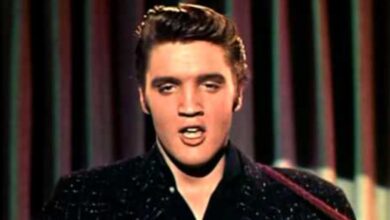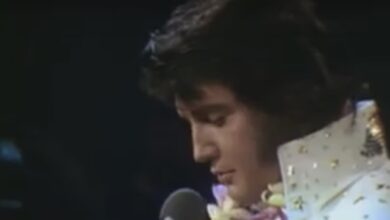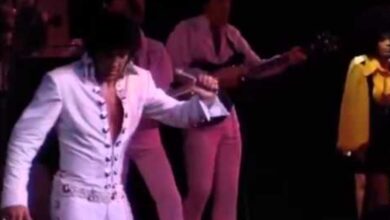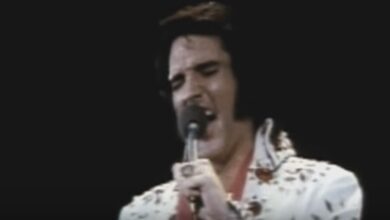Elvis Commanding The Orchestra With His Fluid Movements—an Utterly Captivating Spectacle!
“Patch It Up” is a song written by Eddie Rabbitt and Rory Bourke, and performed by Elvis Presley. It was recorded in June 1970 and was part of his live performance repertoire during that time. The song stands out for its upbeat tempo and energetic delivery, capturing the essence of Elvis’s live performance style in the early 1970s.
Recording and Release
Elvis recorded “Patch It Up” on June 8, 1970, at RCA Studio B in Nashville, Tennessee. This session was part of a larger series of recordings that included material for both his upcoming album and singles. The song was released as a single on October 6, 1970, with “You Don’t Have to Say You Love Me” on the B-side. Both songs were also featured in the album “Elvis: That’s the Way It Is,” which was the soundtrack for the documentary of the same name.
Live Performances
“Patch It Up” became a staple in Elvis’s live performances, particularly during his 1970 Summer Festival at the International Hotel in Las Vegas. These performances were part of the filming for the “Elvis: That’s the Way It Is” documentary, which provided a behind-the-scenes look at Elvis preparing for and performing in his Las Vegas shows. The live versions of “Patch It Up” are known for their high energy and Elvis’s dynamic stage presence, often featuring extended instrumental sections and Elvis interacting with the audience.
Song Characteristics
The song itself is a fast-paced, rock and roll number with a strong rhythm section, featuring prominent guitar riffs and a driving beat. The lyrics talk about a relationship on the rocks, with the singer urging to “patch it up” and fix the problems. The urgency and passion in Elvis’s delivery reflect the themes of the song, making it a memorable part of his repertoire from this period.
Impact and Legacy
“Patch It Up” is remembered as one of the key tracks from the “That’s the Way It Is” project. While it did not achieve the same level of commercial success as some of Elvis’s other hits, it remains a favorite among fans for its raw energy and the powerful live performances associated with it. The song showcases Elvis’s ability to bring intensity and emotion to his music, qualities that were hallmarks of his live shows in the 1970s.
Elvis Presley: A Brief Biography
Elvis Aaron Presley was born on January 8, 1935, in Tupelo, Mississippi. He is often referred to as the “King of Rock and Roll” and is one of the most significant cultural icons of the 20th century. Elvis’s music career began in 1954 when he signed with Sun Records. His unique blend of country, rhythm and blues, and gospel music helped to create a new genre that would come to be known as rock and roll.
Early Career and Rise to Fame
Elvis’s early recordings with Sun Records, such as “That’s All Right” and “Blue Moon of Kentucky,” quickly gained popularity, leading to his first major recording contract with RCA Victor in 1955. His breakthrough came with the release of “Heartbreak Hotel” in 1956, which became a number one hit. Elvis’s charismatic performances and good looks made him a sensation, and he soon became a household name.
Military Service and Comeback
In 1958, Elvis was drafted into the United States Army and served in Germany until 1960. Upon his return, he resumed his music career and also starred in a series of successful films. However, by the late 1960s, his career had begun to wane. This changed with his 1968 television special, known as the “Comeback Special,” which reignited his career and led to a series of successful live performances and recordings.
Later Years and Legacy
The 1970s saw Elvis focus more on live performances, particularly in Las Vegas, where he became known for his elaborate shows and powerful voice. Despite health problems and personal issues, Elvis continued to perform until his death on August 16, 1977. His music and legacy continue to influence artists and fans around the world, making him one of the most enduring figures in popular culture.
In summary, “Patch It Up” is a testament to Elvis Presley’s enduring appeal and his ability to captivate audiences with his energetic performances. The song remains a notable part of his extensive catalog, reflecting the passion and talent that made him a legendary figure in music history.



